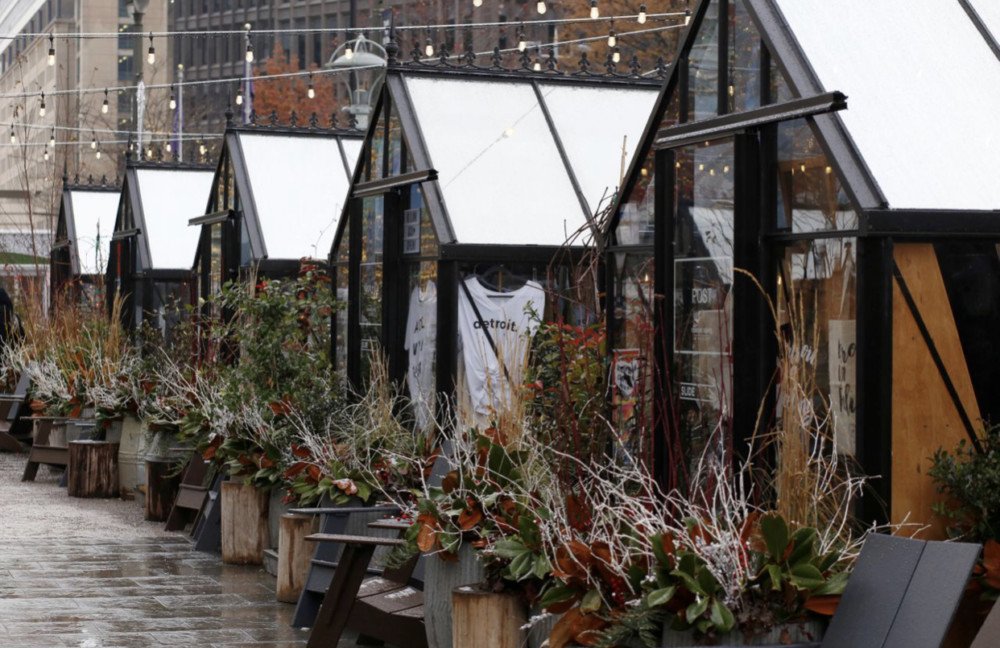By John Gallagher
Detroit Free Press
WWR Article Summary (tl;dr) A pop-up is a temporary retail site often created as part of seasonal markets, special events, or in unusual locations chosen to attract new visitors. Welcome to the Detroit Holiday Market!
Detroit Free Press
Chocolate maker Joe Nader delights in offering his hand-painted European style bon bons to holiday shoppers. But since his Guilt Chocolates is less than a year old, launched with his partners just last Valentine’s Day, the operation is too new to support a permanent storefront.
So this year’s holiday market in downtown Detroit offers the perfect solution for entrepreneurs like Nader — a “pop-up” site.
A pop-up is a temporary retail site often created as part of seasonal markets, special events, or in unusual locations chosen to attract new visitors. Pop-ups can last as little as a few hours or as long as several weeks, as with Detroit’s holiday pop-ups.
Detroit’s holiday market features a few dozen small pop-up sites at three locations downtown, on Capitol Park, Cadillac Square and along Woodward Avenue. Bedrock, the real estate arm of businessman Dan Gilbert’s family of companies, operates the holiday markets along with Gilbert’s Quicken Loans Community Fund.
This year’s holiday market also has support from the Downtown Detroit Partnership and were designed by Groundswell Design Group.
“What Bedrock’s doing is giving people a chance to incubate their business without having a bricks-and-mortar shop,” Nader said. “It means everything to us because we’re very confident we have a great product, but to get the exposure of our brand and our product, we couldn’t reach the breadth of that many people without this.”
The concept of pop-up retail is both old and new. For centuries, retailers have opened seasonal farmers stalls, Christmas markets, July Fourth fireworks stands, and the like. But the term “pop-up” as it refers to a specific type of retail — a temporary venue often located in a trendy urban location — goes back only about 20 years or so.
Increasingly, pop-ups have become part of a well-defined strategy to enliven emerging or distressed urban spaces.
Indeed, the brief life of most pop-ups belies their importance. Pop-ups as now practiced in many cities accomplish two important goals.
First, pop-ups allow hopeful entrepreneurs like Nader to try out their concepts without the larger investment of a permanent bricks-and-mortar storefront. Many of today’s popular retailers in Detroit — Sister Pie, Corridor Sausage, The Source bookstore, and others — all started selling their wares at pop-ups and temporary events until they grew enough to open permanent locations.
And, second, pop-ups play a crucial role in placemaking — the term urban planners use to describe the creation of lively, walkable urban districts. Without Detroit’s holiday markets, Capitol Park and Cadillac Square could remain mostly empty this time of year.
Instead, for the next several weeks the presence of temporary retailers in a location decorated with lights and trees and offering music and food will turn those blank spots downtown into bustling places. The pop-ups create a reason to be downtown that otherwise would be missing.
In Detroit’s holiday market, each pop-up retailer pays a small fee to participate, but the location, the electricity and the overall grounds are included.
Trade can be brisk. On the first day of the market, Nov. 15, Nader said he had about 30 customers. But with the city’s tree lighting on Nov. 16 and the cold weather bringing skaters down to the rink at Campus Martius Park, Nader expects a burst of customers and sales as people come downtown.
This year’s holiday market includes 13 retail vendors in Cadillac Square, eight retail vendors in Capitol Park and 13 at the 1441 Woodward collective. Bedrock said that more than 90 percent of the small businesses are owned and operated by minorities while more than 75 percent are owned by women. All of the businesses are based in Michigan and over 85 percent are based in metro Detroit.
Besides Nader’s Guilt Chocolates, a sample of the other retailers include:
* ILERA Apothecary, offering Nigerian-inspired organic skincare, bath and body products with a shea butter base.
* Kiloh + Co., selling women’s apparel focused on love and inspiration.
* Little High Flyers, offering baby apparel.
* Mitten Crate, which creates gift boxes featuring Michigan-made food products.
* Rock Paper Scissors, selling cards and gifts helping to celebrate special occasions.
* Tiani Body Care, offering body care products made with locally sourced ingredients.
Jamie LaReau contributed to this column.














































































































































































































































































































































































